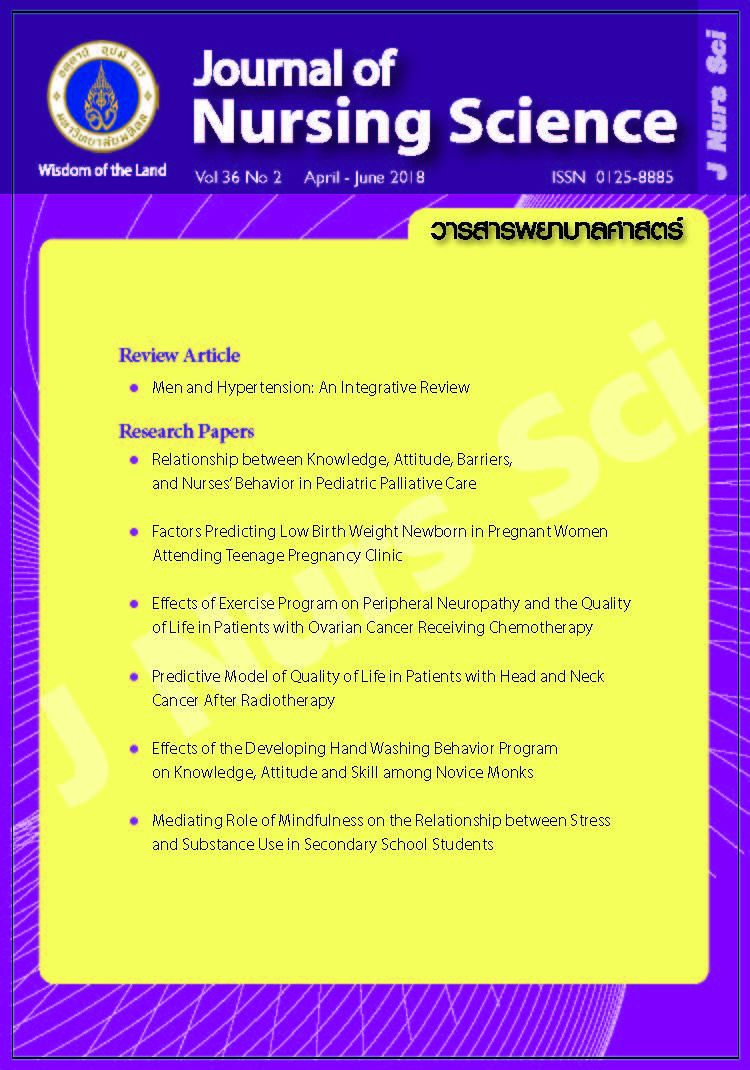Effects of the Developing Hand Washing Behavior Program on Knowledge, Attitude and Skill among Novice Monks
Main Article Content
Abstract
Purpose: To evaluate the effect of the developing hand washing behavior program on knowledge, attitude, and skill among novice monks.
Design: A descriptive study was conducted using a secondary analysis of existing data collected by one faculty of nursing under the 2016 Academic Service Project for the Novice Monks at Wat Phaidam Buddhist School.
Methods: A total of 162 novice monks in the school participate in the Academic Service Project. The data were collected at three phases: before (pre-test), immediately after (post-test1), and one-month after the program. Self-administered questionnaires were used to measure knowledge, attitude, hand washing skill, and the satisfaction towards the program. Descriptive statistics and repeated measures ANOVA were used for data analysis.
Main findings: Results revealed that all handed hygiene knowledge, attitude and skill of novice monks are significantly increase after finishing active participation learning program e (p < .05). The Novice monks showed retention of knowledge, attitude and skill on handed hygiene care at 1 month. Additionally, majority of them (80%) expressed their level of satisfaction towards the program ranging between high and highest.
Conclusion and recommendations: The developing hand washing behavior program helps improving knowledge, attitude, and skill on hand hygiene care. This program should be promoted to apply among novice monks population and positive reinforcement should be given to sustain their hygiene behavior which, in turn, will result in well-being of novice monks.
Article Details
Copyright Notice: Nursing Science Journal of Thailand has exclusive rights to publish and distribute the manuscript and all contents therein. Without the journal’s permission, the dissemination of the manuscript in another journal or online, and the reproduction of the manuscript for non-educational purpose are prohibited.

Disclaimer: The opinion expressed and figures provided in this journal, NSJT, are the sole responsibility of the authors. The editorial board bears no responsibility in this regard.
References
2. Cole M. Breaking the chain of infection. Nursing and Residential Care. 2012;14(6):288-91.
3. Hemakerin J. Review the new emerging diseases in this era [Internet]. Pathum Thani: National Science and Technology Development Agency (NSTDA); 2015 [cited 2015 Jul 28]. Available from: https://www.nstda.or.th/sci2pub/sarawit/Sarawit-Issue28.pdf. (in Thai).
4. Warren-Gash C, Fragaszy E, Hayward AC. Hand hygiene to reduce community transmission of influenza and acute respiratory tract infection: a systematic review. Influenza Other Respir Viruses. 2013;7(5):738-49.
5. Robinson AL, Lee HJ, Kwon J, Todd E, Rodríguez FP, Ryu D. Adequate hand washing and glove use are necessary to reduce cross-contamination from hands with high bacterial loads. J Food Prot. 2016;79(2):304-8.
6. Pilsczek FH. Infection control in developing countries: Phnom Penh and Kabul. Am J Infect Control. 2009;37(1):81-2.
7. Chankhaw S. A study of health behaviors of Prapariyattidham Wat Sothonwararam school students Chachoengsao Province. Journal of Faculty of Physical Education. 2012;15 Suppl;336-51. (in Thai).
8. Department of Health, Ministry of Public Health. 7 steps of hand washing for disease free and safety [Internet]. Nonthaburi: Department of Health; 2017 [cited 2018 Apr 1]. Available from: https://www.anamai.moph.go.th/ewt_news.php?nid=11272&filename=2016. (in Thai).
9. World Health Organization. Diarrhoeal disease [Internet]. Geneva, Switzerland: World Health Organization; 2017 [cited 2017 May 2]. Available from: http://www.who.int/mediacentre/factsheets/Fs330/en/index.html.
10. Bandura A. Social foundations of thought and action: a social cognitive theory. Englewood Cliffs, NJ: Prentice-Halls; 1986.
11. Chen Y-C & Chiang LC. Effectiveness of hand-washing teaching programs for families of children in paediatric intensive care units. J Clin Nurs. 2007;16(6):1173-9.
12. Rubanprem KSA, Aruna S, Sasikala M. Effectiveness of hand hygiene teaching on knowledge and compliance of hand washing among the students at a selected school in Mugalivakkam village, Kancheepuram District. International Organization of Scientific Research Journal of Nursing and Health Science. 2014;3(4):56-60.
13. Moussa MMM, Abdella NHA, Abu-Elenen NRM, Elkazaz RH. Effectiveness of a training program on improving the hand washing among children in primary schools. International Journal of Advanced Nursing Studies. 2015;4(2):49-54.


